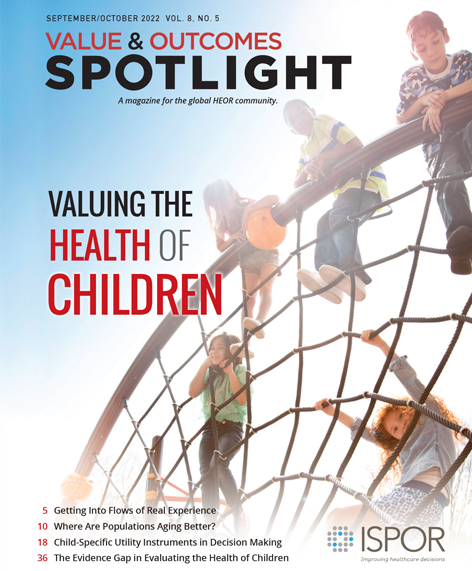Research Roundup
Section Editor: Aakash Bipin Gandhi, BPharm, PhD, Research Scientist, RWE, Sanofi, Cambridge, MA, USA
The challenges of measuring and valuing quality of life in preschool children: a retrospective review of NICE appraisals.
Lamb A, Murray A, Lovett R. Children. 2021;8(9):765.
Summary
The study by Lamb et al examined past National Institute of Health and Care Excellence (NICE) appraisals to identify methods used to measure health-related quality of life (HRQoL) among preschool children (< 5 years of age). The authors reviewed 12 NICE appraisals and found that measures usually designed for adults were predominantly used to value HRQoL among preschool children. The review revealed a strong reliance on data from adults or clinical experts for HRQoL measures in this population. Further, the instruments used to collect these data were not validated among the preschool children population. While the review committees for these appraisals acknowledge that collecting HRQoL data among preschool children is challenging, they also state that data on these aspects obtained through parents and guardians during clinical trials could be valuable inputs. Based on their review of NICE appraisals, the authors also identified several research priorities related to HRQoL measures among preschool children. These include evaluating psychometric properties of current measures, testing the feasibility and validity of valuation studies in the literature, and mapping.
Relevance
This study highlights the dearth in the availability of age-specific HRQoL measures as well as the lack of consensus on appropriate methods to evaluate HRQoL among preschool children. Progress in this field can help capture HRQoL aspects that matter most to preschool children and their families.
Valuing child and adolescent health: a qualitative study on different perspectives and priorities taken by the adult general public.
Powell PA, Rowen D, Rivero-Arias O, Tsuchiya A, Brazier JE. Health Qual Life Outcomes. 2021;19(1):1-14.
Summary
The aim of the present study was to qualitatively examine the impact of different perspectives on an adult’s (ie, general United Kingdom adult population) valuation of child and adolescent health states or stated preferences. Further, the study also examined how an adult’s general attitude and prioritization of children’s health affected their valuation of health states in this population. Overall, the study found that participants did not display any strong preferences on prioritizing child and adolescent health over that of that of the general working-age adult population. The authors found that study participants’ views on children and adolescent health were heterogeneous and differed by the dimension being valued. For example, study participants were more likely to give up a similar number of life years for children as they were for adults who suffer from mental health and pain conditions as compared to other conditions.
Relevance
The study by Powell and colleagues highlights the importance of considering the methodological impact of perspectives used when an adult sample is to be used to make valuations regarding child or adolescent health states.
Measuring the health-related quality of life in young children: how far have we come?
Germain N, Aballéa S, Toumi M. J Mark Access Health Policy. 2019;7(1):1618661.
Summary
The article by Germain et al reviews the current status and challenges associated with HRQoL measurement among children under the age of 5. The authors found that there is a dearth of instruments for HRQoL measurements which are brief, user-friendly, and can be easily adopted in routine clinical practice, observational studies, or disease registries. Further, there is a need to develop theoretical models of HRQoL through continued research to help support valuation of health states during specific pediatric development stages of a child. Additionally, there is a need for consensus on whether parent’s or proxy reporting of health states should be only limited to observable concepts versus being dependent on their input for factors including social and emotional functioning.
Relevance
There is a need to develop and validate age-specific HRQoL measures for valuing pediatric health to aid reimbursement decision making for payers and policy makers, especially given the rapid increase in approvals of breakthrough therapies for treating severe childhood disease conditions.
Note from the Section Editor: Views, thoughts, and opinions expressed in this section are my own and not those of any organization, committee, group, or individual that I am affiliated with.

